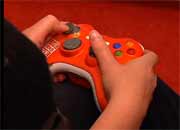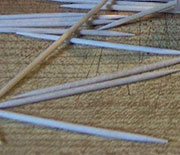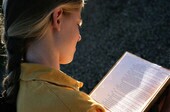healthnewslink
Kids Newsletter
September 17, 2012 |
| In this Issue |
|
|
|
|
Do Video Games Promote Reckless Driving in Certain Teens?
Study found young sensation-seekers had more accidents, tickets and unsafe habits behind the wheel
 FRIDAY, Sept. 14 (HealthDay News) -- Teens who play video games that glorify risk may be more likely to become reckless drivers, a new study suggests.
Researchers say these teens have more car accidents and moving violations, and are more willing to drink and drive.
The study was published online recently in the journal Psychology of Popular Media Culture.
The researchers conducted a series of four phone interviews with more than 5,000 U.S teens over the course of four years.
Taking the teens' gender, age, race, household income, education and parents into account, the researchers asked them to rate their levels of sensation seeking and rebelliousness.
Half of the teens said in their initial interview that they were allowed to play mature-rated games. Of those teens, 32 percent said they had played "Spider-Man 2," while 12 percent had played "Manhunt" and 58 percent had played "Grand Theft Auto III."
"Spider-Man 2" is rated "Teen" by the Entertainment Software Rating Board, while "Manhunt" and "Grand Theft Auto III" are rated "Mature."
These games are linked to greater sensation seeking and rebelliousness, the researchers said, which are in turn related to self-reported risky driving, car accidents, traffic stops and a willingness by the teens to drink and drive.
By the third of the four interviews -- when participants were roughly 16 years old -- 21 percent of teens said they had been stopped by police, 14 percent reported having a car accident and 25 percent admitted to unsafe driving habits such as speeding, tailgating, running red lights or ignoring stop signs.
"Most parents probably would be disturbed to learn that we observed that this type of game play was more strongly associated with teen drivers being pulled over by the police than their parenting practices," study lead author Jay Hull, a psychology professor at Dartmouth College, said in a journal news release.
"Playing these kinds of video games could also result in these adolescents developing personalities that reflect the risk-taking, rebellious characters they enact in the games and that could have broader consequences that apply to other risky behaviors such as drinking and smoking," Hull added.
The researchers pointed out their findings were limited since the teens' habits were based on their own perceptions of their driving. "At the same time, because the study began when the participants were playing video games but were too young to drive, it is clear that the video-game exposure preceded the risky driving," Hull said.
Although the study found an association between teen video-game playing and driving habits, it did not prove a cause-and-effect relationship.
More information
The American Academy of Pediatrics has more about the health effects of video games  . .

|
Kids' Vaccine Exemptions Too Easy to Obtain: Study
Only kindergarten students who truly need waivers should get them, to protect group immunity

MONDAY, Sept. 10 (HealthDay News) -- Medical exemption rates for required vaccinations for kindergarten students are higher in states where such exemptions are easier to get, which compromises group immunity and poses a threat to children and others who really should not be immunized due to underlying health conditions, a new study suggests.
The findings show that medical exemptions for vaccinations should be closely monitored and continuously evaluated to ensure they are used appropriately, said the researchers at Emory University, in Atlanta.
They examined kindergarten entry requirements over seven school years -- which translated to nearly 88,000 exemptions nationwide from 2004-2005 to 2010-2011. Compared to states with more stringent exemption criteria, states with looser criteria had a significant increase in exemptions during the study period.
The results suggest that requiring both parents and doctors to be more accountable for granting medical exemptions may help ensure that these exemptions are valid and not used as an alternative to non-medical exemptions (which may be harder to obtain) the researchers said.
The study was published online Aug. 29 in The Journal of Infectious Diseases.
"The appropriate use of medical exemptions is important to maintaining sufficient herd immunity to protect those who should not be vaccinated due to medical contra-indications," study senior investigator Saad Omer said in a journal news release. "Medical providers, parents, school officials, and state health officials are responsible for ensuring that medical exemptions are actually medically indicated."
The findings should prove useful to officials responsible for implementing and enforcing school immunization requirements at the state and local levels, Daniel Salmon and Dr. Neal Halsey, of the Johns Hopkins Bloomberg School of Public Health, wrote in an accompanying editorial.
They noted that "children with valid medical exemptions need to be protected from exposure to vaccine-preventable diseases by insuring high coverage rates among the rest of the population. Granting medical exemptions for invalid medical contraindications may promote unfounded vaccine safety concerns."
More information
The American Academy of Family Physicians has more about childhood vaccines  . .

|
Swallowed Toothpicks Can Lead to Big Trouble, Experts Warn
One woman suffered blood poisoning but recovered after surgery

TUESDAY, Sept. 10 (HealthDay News) -- Accidentally swallowing a toothpick or other foreign object can cause serious health problems, such as blood poisoning (sepsis) or liver abscess.
Researchers reporting Sept. 11 in BMJ Case Reports said toothpicks, pins, nails or small bones that end up in the gut may not show up on conventional X-rays and often create vague symptoms, making detection difficult.
In one instance, a woman who accidentally swallowed a toothpick developed gut pain and fever, as well as nausea, vomiting and low blood pressure, they said. An ultrasound revealed the toothpick had lodged in her liver, causing an abscess and blood poisoning. The woman recovered after treatment with antibiotics and surgical removal of the toothpick from her liver.
Her case is one of more than 4,000 in a collection of international online reports, the researchers said.
Post-surgical oversights account for many of the cases. Surgeons leave a swab inside a patient's body in one of every 1,500 abdominal surgeries, the researchers said.
This situation, known as gossypiboma, affected one woman who underwent surgery for a prolapsed womb. A swab left inside her lodged near her rectum and changed her normal bowel habits. Ultimately, the swab was found during a CT scan and removed. Her symptoms disappeared.
"Swallowing foreign bodies is relatively common, particularly among children," the researchers said in a journal news release. Usually, they don't cause damage unless they create an obstruction or chemical burn, they said.
More information
The U.S. National Institutes of Health provides more information on swallowed and inhaled foreign objects.

|
Making Parental Peace With Kids' Homework
Help your child get the most from homework without hassles, hovering
 SATURDAY, Aug. 25 (HealthDay News) -- The start of a new school year is edging closer and it might be a good idea for parents to start thinking about how they're going to deal with homework issues, one expert suggests.
"The battle is different for every family. Some children resist starting their homework, some have a hard time finishing and others do their homework -- but don't turn it in," Drew Edwards, an adjunct associate professor of psychology at Wake Forest University in Winston-Salem, N.C., said in a university news release.
Parents should work with their children to develop an effective system for bringing school assignments home, such as a notebook that children use to record daily homework assignments, or an assignment sheet that they take to school.
"It's important to get in the habit of writing it down and bringing it home. That will help students get in the habit of bringing home the correct textbook or other materials needed to finish their homework," Edwards said.
Here are some other tips:
- Children need to find the right spot to do their homework. Have them try doing it in several places until they find the one that feels right.
- Determine the right time for children to do their homework. Pick a time -- such as right after school or after dinner -- and try it for two weeks. If that doesn't work, try another time for two weeks.
- Determine if your child likes to do homework in a certain order, such as starting with the hardest assignments. You can offer suggestions, but let the child make the final decision.
- Have your child focus on one subject at a time and put away all other books and materials. "Looking at a pile of books can make a child feel overwhelmed or can just make it tough to focus on the current assignment," Edwards explained.
- While you should offer support and encouragement, try not to hover.
Do not nag your children about their homework and do not do their homework. These are two of the biggest mistakes parents make.
"School is important but so is the relationship you have with your child. Don't let homework become an issue that harms that relationship," Edwards said.
More information
The Nemours Foundation offers more homework tips  . .

|
| Copyright © 2012 ScoutNews, LLC. All rights reserved. |
|